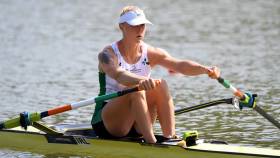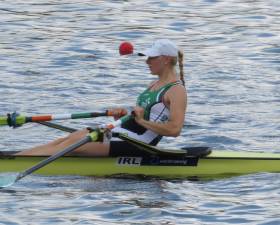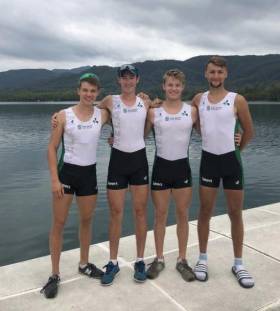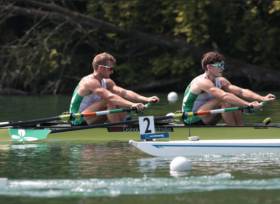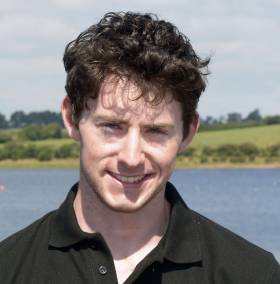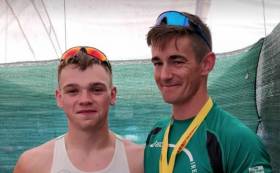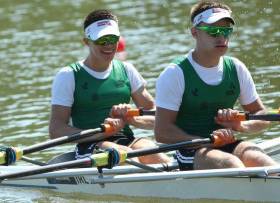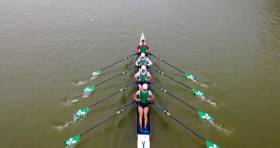Displaying items by tag: Plovdiv
Brilliant Performance Yields World Championship Gold for O'Donovan Brothers
#Rowing: Ireland won gold at the World Rowing Championships with another brilliant row by the O’Donovan brothers. The Ireland lightweight double were in one of the unfavoured lanes - lane six - after taking third in their semi-final. But when it mattered they won.
Italy set off fast, but the O’Donovans chased them down and caught them in coming into the final quarter. They then produced their fastest 500 metres of their race to cross the line first and thrill the roaring crowd.
Italy took second, Belgium third. Before the race, Norway had to replace Kris Brun with Jens Holm.
World Rowing Championships, Plovdiv, Bulgaria, Day Seven (Irish interest):
Men
Lightweight Double Sculls – A Final: 1 Ireland (G O’Donovan, P O’Donovan) 6:06.81, 2 Italy 6:08.31, 3 Belgium 6:11.25.
Women
Pair – A Final: 1 Canada 6:50.67, 2 New Zealand 6:52.96, 3 Spain 7:04.60; 6 Ireland (A Keogh, E Hegarty) 7:15.70.
Puspure Wins Semi-Final to Take A Final Place at World Rowing Championships
#Rowing: Sanita Puspure won her semi-final and progressed confidently to the A Final of the single sculls at the World Rowing Championships in Plovdiv, Bulgaria. While Fie-Udby Erichsen of Denmark staged an early challenge and led, Puspure swept through her as they approached the 1,000 metres. She then powered away and won with two lengths of clear water to spare.
Carling Zeeman was a good tip to join the two in the A Final, but caught a crab which momentarily stopped her boat. Annekatrin Thiele took the third and final qualifying spot.
Jeannine Gmelin of Switzerland won the second semi-final from Kara Kohler of the United States, with Magdalena Lobnig of Austria just squeezing out Madeleine Edmunds of Australia for the third A Final spot. Gmelin’s time was just .92 of a second off Pupure’s.
World Rowing Championships, Plovdiv, Bulgaria, Day Six (Irish interest)
Men
Double – Semi-Final One (First Three to A Final; rest to B Final): Britain 6:06.59, 2 New Zealand 6:08.00, 3 Romania 6:08.17; 5 Ireland (P Doyle, R Byrne) 6:10.95.
Women
Eight – Repechage (First Four to A Final): 4 Britain (8 R Shorten) 6:04.63.
Single Sculls – A/B Semi-Final (First Three to A Final; rest to B Final): 1 Ireland (S Puspure) 7:23.01, 2 Denmark (F-U Erichsen) 7:30.73, 3 Germany (A Thiele) 7:32.74.
Remarkable Win Sends Doyle and Byrne Into Semi-Finals
#Rowing: Philip Doyle and Ronan Byrne had a remarkable win in their repechage at the World Rowing Championships here in Plovdiv, Bulgaria. The new Ireland double shot away from the start and opened a clearwater lead over all five of their opponents. Russia and then, over the second half of the race, pushed up but could never catch the Irish, who won by over three seconds.
World Rowing Championships, Plovdiv, Bulgaria, Day Five (Irish interest)
Men
Double Sculls – Repechage Four (First Two to A/B Semi-Final): Ireland (P Doyle, R Byrne) 6:16.96, 2 Bulgaria 6:20.15.
Puspure Dominates Heat at World Rowing Championships
#Rowing: Sanita Puspure punched in an outstanding performance as she won her heat of the single sculls at the World Rowing Championships in Plovdiv in Bulgaria. The Ireland sculler led off the start and gave her opponents no chance to challenge her for the one semi-final qualfication place on offer. She had a clearwater lead by 500 metres and eventually won by over 14 seconds from Fie-Udby Erichsen of Denmark.
Monika Dukarska and Aileen Crowley looked good in the early stages of their heat of the women’s double sculls, but the race got away from them in the second 1,000 metres and they finished sixth. Canada and Germany were clear leaders through the middle of the race and looked set to take the two qualification spots for the semi-finals. The Netherlands pushed up in the final third of the race and took out Germany, who dropped back to fourth.
World Rowing Championships, Plovdiv, Bulgaria, Day Two (Irish interest)
Men
Lightweight Quadruple Sculls – Heat Two (First to A Final; rest to Repechage): 1 Italy 5:48.03; 3 Ireland (F McCarthy, R Ballantine, J McCarthy, A Goff) 5:53.43.
Women
Double Sculls – Heat One (First Two to A/B Semi-Final; rest to Repechage): 1 Canada 6:54.02, 2 Netherlands 6:55.57; 6 Ireland (M Dukarska, A Crowley) 7:08.79.
Single Sculls – Heat One (Winner to A/B Semi-Finals; rest to Repechage): 1 Ireland (S Puspure) 7:25.78; 2 Denmark 7:39.93.
Ireland Lightweight Quadruple Take Third in Heat at World Rowing
#Rowing: Ireland finished third in their heat of the lightweight quadruple sculls this morning at the World Rowing Championships in Plovdiv, Bulgaria. Italy took the one direct qualification place for the Final. The men in blue harnessed the good conditions and built a lead through the race. They had a clearwater advantage by the final quarter. In a battle for second place, the Czech Republic pipped the Ireland crew of Fintan McCarthy, Ryan Ballantine, Jake McCarthy and Andrew Goff.
World Rowing Championships, Plovdiv, Bulgaria, Day Two (Irish interest)
Men
Lightweight Quadruple Sculls – Heat Two (First to A Final; rest to Repechage): 1 Italy 5:48.03; 3 Ireland (F McCarthy, R Ballantine, J McCarthy, A Goff) 5:53.43.
O'Donovans Speed into Quarter-Finals at World Rowing Championships
#Rowing: Ireland’s Paul O’Donovan and Gary O’Donovan won their heat with a sparkling performance at the World Rowing Championships in Plovdiv. Germany’s newly-formed lightweight double of Jonathan Rommelmann and Konstantin Steinhuebel seemed set to give the Ireland crew a test, leading through half way and 1500 metres. But the O’Donovans had much better base speed and left their rivals behind in the final quarter. Portugal and Argentina also qualified for the quarter-finals.
Denise Walsh and Aoife Casey finished fourth in their heat of the lightweight double sculls. The first two positions were the valuable ones, as they secured a place in the semi-finals. New Zealand, Australia and Canada fought it out, with New Zealand’s Zoe McBride and Jackie Kiddle securing a clear first, while Australia edged Canada out by .34 of a second. Walsh and Casey were over 10 seconds further back.
The women’s pair of Aifric Keogh and Emily Hegarty qualified from their heat for the semi-finals, finishing second, while the men’s pair (fifth) and double (second) will have to compete in repechages.
World Rowing Championships, Plovdiv, Bulgaria, Day One (Irish interest)
Men
Pair – Heat Four (First Four to Quarter-Finals; rest to Repechage): 1 Canada 6:20.46, 2 South Africa 6:21.85, 3 France 6:25.43, 4 Belarus 6:28.22; 5 Ireland (M O’Donovan, S O’Driscoll) 6:29.10
Double Sculls – Heat One (Winner to A/B Semi-Final; rest to Repechages): 1 New Zealand 6:02.23; 2 Ireland (P Doyle, R Byrne) 6:12.61
Lightweight Double Sculls – Heat Five (First Four to Quarter-Finals; rest to Repechage): 1 Ireland (G O’Donovan, P O’Donovan) 6:15.79, 2 Germany 6:19.23, 3 Portugal 6:21.55, 4 Argentina 6:30.24.
Women
Pair – Heat One (First Three to A/B Semi-Final; rest to Repechage): 1 New Zealand 6:56.06, 2 Ireland (A Keogh, E Hegarty) 7:11.51, 3 United States 7:13.02.
Lightweight Double Sculls – Heat Three (First Two to A/B Semi-Finals; rest to Repechages): 1 New Zealand 6:50.04, 2 Australia 6:51.11; 4 Ireland (A Casey, D Walsh) 7:02.25.
Doyle and Byrne Impress but Disappointment for O'Donovan and O'Driscoll
#Rowing: Ireland’s Ronan Byrne and Philip Doyle produced a fine performance in their first competitive race together at the World Rowing Championships in Plovdiv, Bulgaria. The Ireland double were up against it in their heat, with just one crew going directly to the A/B Semi-Finals. New Zealand’s John Storey and Chris Harris made that theirs, using the fast conditions well. Italy and Ireland looked set to battle it out for second, but Doyle and Byrne opened up in the second half of the race and were well clear in second at the line.
Mark O’Donovan and Shane O’Driscoll finished a disappointing fifth in the men’s pairs heat and will have to compete in a repechage to make the quarter-finals. Canada were impressive winners from South Africa and France, with Ireland and Belarus vying for the crucial fourth place and direct qualification. Ireland had a slight advantage with 500 metres to go, but the Belarussians wrested back the lead and had almost a second to spare crossing the line.
The women’s pair of Aifric Keogh and Emily Hegarty qualified from their heat for the semi-finals, finishing second.
World Rowing Championships, Plovdiv, Bulgaria, Day One (Irish interest)
Men
Pair – Heat Four (First Four to Quarter-Finals; rest to Repechage): 1 Canada 6:20.46, 2 South Africa 6:21.85, 3 France 6:25.43, 4 Belarus 6:28.22; 5 Ireland (M O’Donovan, S O’Driscoll) 6:29.10
Double Sculls – Heat One (Winner to A/B Semi-Final; rest to Repechages): 1 New Zealand 6:02.23; 2 Ireland (P Doyle, R Byrne) 6:12.61
Women
Pair – Heat One (First Three to A/B Semi-Final; rest to Repechage): 1 New Zealand 6:56.06, 2 Ireland (A Keogh, E Hegarty) 7:11.51, 3 United States 7:13.02.
#Canoeing: Ronan Foley won the B Final of the Junior K1 1,000 metres at the Canoe Sprint World Junior and Under-23 Championships in Plovdiv, Bulgaria, today. The Kilcullen man had over two seconds to spare over his nearest rival, Philip Miles of Britain. The win places him 10th overall.
Just three weeks ago, Foley took gold in the canoe marathon European Championships in Croatia.
Canoe Sprint World Junior Championships, Plovdiv, Bulgaria
Junior K1 1,000 – B Final (Places 10 to 18): 1 Ireland (R Foley) 3 min 38.463 sec.
McCarthy Twins Just Off Final Mark at World Under-23 Rowing
#Rowing: Ireland’s lightweight double of Fintan and Jake McCarthy missed out on an A Final at the World Under-23 Championships by just one place. They finished fourth behind Canada, Spain and South Africa in an intriguing race which had a close finish.
Spain led through through the 500 and 1,000-metre marks, with Ireland towards the back of the field. Canada took over the lead in the second half and went on to win. Behind them, Spain clung on to second. Three boats vied for the the vital third spot: South Africa, Ireland and Britain. Ireland had a good second quarter and were back in the mix with a good finish, but South Africa had the best final 500 metres and took third, less than a second ahead of Ireland. Britain were fifth.
World Under-23 Championships, Plovdiv, Bulgaria (Irish interest)
Men
Lightweight Double Sculls – Semi-Finals (First Three to A Final; rest to B Final)
Semi-Final One: 1 Denmark 6:18.69, 2 Italy 6:21.85, 3 Germany 6:23.22.
Semi-Final Two: 1 Canada 6:19.88, 2 Spain 6:20.66, 3 South Africa 6:21.69; 4 Ireland (F McCarthy, J McCarthy) 6:22.56, 5 Britain 6:23.77, 6 Poland 6:42.15.
#Rowing: The Ireland lightweight quadruple of Niall Beggan, Stephen O’Connor, Andrew Goff and Shane O’Connell qualified for the A Final at the World Under-23 Championships today by finishing third in their semi-final. Austria won the race in Plovdiv, Bulgaria in a new best time for the Championships. Ireland, who were down the field in the early stages, had a very strong middle of the race and coming up to the line they fought it out with Italy and Germany for the crucial second and third spots. Germany lost out, taking fourth.
The race was run in temperatures of over 30 degrees centigrade and good conditions – the best time was bettered immediately by the winners of the next semi-final, Switzerland.
World Rowing Under-23 Championships, Day Three (Irish interest)
Men
Lightweight Quadruple Sculls – Semi Finals (First Three to A Final; rest to B Final) – Semi-Final One: 1 Austria 5:47.86, 2 Italy 5:48.02, 3 Ireland (N Beggan, S O’Connor, A Goff, S O’Connell) 5:48.39; 4 Germany 5:49.57.
Semi-Final Two: 1 Switzerland 5:47.26, 2 Britain 5:49.31, 3 France 5:50.52.


























